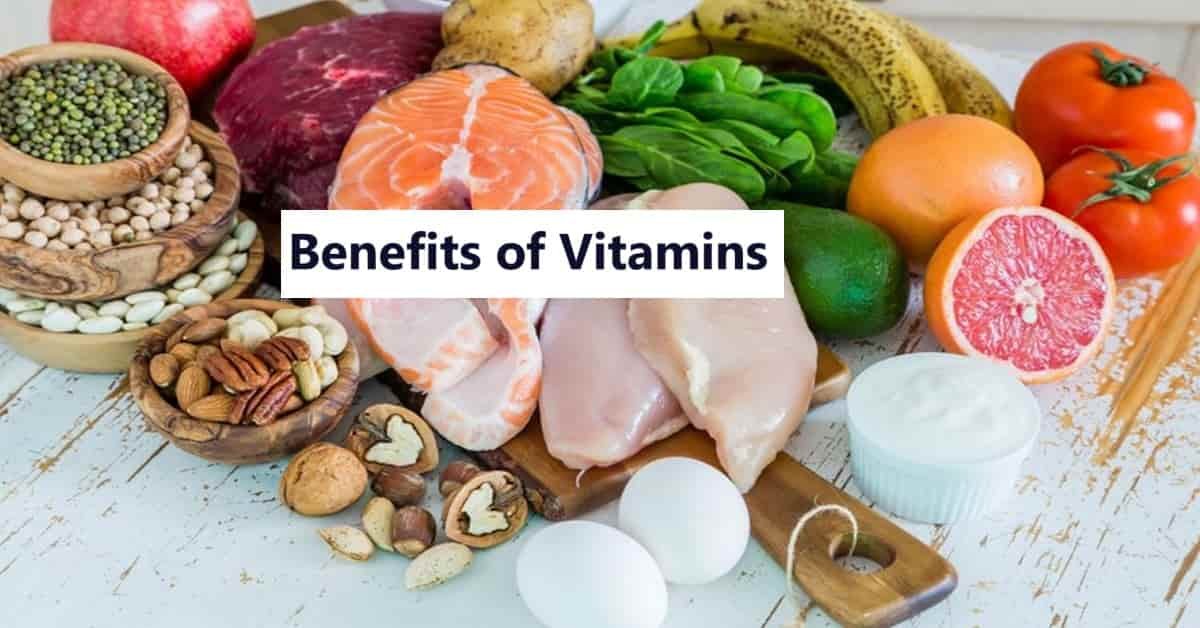Vitamins are organic compounds that are essential for various bodily functions and maintaining overall health. Each vitamin has its own unique set of benefits. Here are some general benefits of vitamins:
1. Supporting Metabolism
- Vitamins are crucial for energy production in the body. They help convert carbohydrates, fats, and proteins from food into energy. For example, B vitamins (like B1, B2, B3, B5, B6, B7, B9, and B12) play key roles in metabolic processes.
2. Boosting Immunity
- Vitamins such as Vitamin C and Vitamin D are vital for supporting the immune system. They help the body fend off infections and reduce the risk of illness.
3. Promoting Healthy Skin, Hair, and Nails
- Vitamins A, E, and Biotin (B7) play significant roles in maintaining healthy skin, hair, and nails. They promote cell growth and repair, helping to prevent skin damage and hair loss.
4. Enhancing Bone Health
- Vitamin D is essential for calcium absorption, keeping bones strong and healthy. Vitamin K also plays a role in bone metabolism and helps prevent osteoporosis.
5. Supporting Vision and Eye Health
- Vitamins A, C, and E contribute to maintaining good eyesight and overall eye health. They help protect the eyes from oxidative stress and lower the risk of age-related macular degeneration.
6. Promoting Healthy Red Blood Cell Production
- Vitamins B6, B9 (Folate), and B12 are important for the formation of red blood cells, helping to prevent anemia and ensuring proper oxygen transportation in the body.
7. Reducing the Risk of Chronic Diseases
- Antioxidant vitamins, such as Vitamin C and Vitamin E, help combat oxidative stress and reduce inflammation in the body, lowering the risk of chronic diseases like heart disease, diabetes, and cancer.
8. Supporting Brain Function and Mood Regulation
- Certain B vitamins, particularly B12, B6, and Folate, are essential for brain health. They help in the synthesis of neurotransmitters that regulate mood, potentially reducing the risk of depression and cognitive decline.
Types of Vitamins
Vitamins are classified into two main categories based on their solubility:
1. Water-Soluble Vitamins
- These vitamins dissolve in water and are not stored in large amounts in the body; excess amounts are excreted through urine. Regular intake through diet is necessary.
- Examples:
- Vitamin C (Ascorbic acid)
- B Vitamins:
- Examples:
2. Fat-Soluble Vitamins
- These vitamins are soluble in fats and oils. They can be stored in the liver and fatty tissues for later use, which means they do not need to be consumed as frequently.
FAQs About Vitamins
1. How do I know if I need vitamin supplements?
- The need for vitamins depends on dietary intake, health status, and life stage. A healthcare professional can assess your diet and perform blood tests to determine if you need supplementation.
2. Can I get enough vitamins from my diet?
- Most people can obtain sufficient vitamins by consuming a balanced and varied diet rich in fruits, vegetables, whole grains, lean proteins, and healthy fats. However, certain groups, like pregnant women or those with specific health conditions, may require supplements.
3. Are vitamin supplements safe?
- While many vitamin supplements are safe, taking them in excessive amounts can lead to toxicity, particularly with fat-soluble vitamins (A, D, E, K). It’s essential to follow recommended dosages and consult a healthcare provider, especially if combining with other medications.
4. How do vitamins affect my energy levels?
- Vitamins, especially B vitamins, play a critical role in energy metabolism. They help convert food into energy and are vital for maintaining stamina and reducing fatigue. However, low energy levels can also signal other health issues.
5. Can I overdose on vitamins?
- Yes, particularly with fat-soluble vitamins, which can accumulate in the body. Water-soluble vitamins are generally excreted in urine, but excessive intake can still cause side effects. Always adhere to recommended daily allowances (RDAs).
6. Do vitamins have an expiration date?
- Yes, vitamins do have expiration dates, but many may still be effective past this date, as long as they are stored properly. However, the potency may decrease over time, and it’s best to follow the manufacturer’s guidelines.
7. What are the best food sources for vitamins?
- Whole foods such as fruits, vegetables, nuts, seeds, whole grains, dairy products, and lean meats offer a wide array of vitamins. A varied diet is the best approach to ensure adequate vitamin intake.
8. Can vitamins help prevent diseases?
- Vitamins play a role in overall health, and adequate intake can lower the risk of certain diseases. However, they are not a substitute for a healthy lifestyle or treatments for specific medical conditions.


